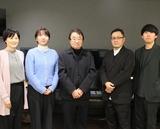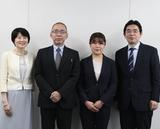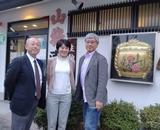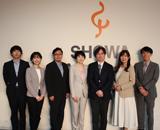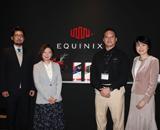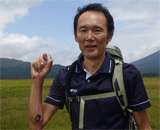March 2016
Diamond Harvard Business Review: Contributions to Leaders Determined to Change the World
What Makes a Good Translation: a Wide Vocabulary and a Natural Sense of Phrasing
Ohsato: As a translation company, we strive to avoid burdening the editorial team by exercising our ingenuity in order to present you with quality translations. Be that as it may, you often seem to add further edits when preparing the magazine.
When you do so, what type of edits do you perform and from what perspective? I am very interested in hearing that, as I am sure our customers are too.
Kogure: We focus on two points when revising translations.
First, we supplement the translation with added value information when we feel extra explanations are needed. For example, when there is a name or an abbreviation our readers might not be familiar with, we look it up and append it to the article.
Second, we arrange the sentences in a more Japanese fashion, so as to make them more readable and instantly understandable.
Saito I am the project manager in charge of these translations, and I am always astonished by the way you select titles. At Arc Communications, we work especially hard on the essays titles and lead sentences with our translators, still...
Iwasa: Still, sometimes when the magazine comes out, they end up being entirely different from the original translation?
Saito Exactly, and they are replaced with mesmerizing expressions. Sometimes, I discuss it with our translators and we wonder how these titles changed that much.
Recently, the special edition on "HR Tactics" springs to mind, the expression used in the original essay title was "shiny objects" ("Bright, Shiny Objects and the Future of HR"). We couldn't simply use the katakana for those English words in a Japanese sentence, and tried to think of a Japanese phrase that would appropriately convey that meaning... We pondered on it for quite a while. Then, when we read it in the magazine, and the title you had chosen was miles away.
Iwasa: Could you remind me what we ended up using?
Kogure: "Don't Fall for Bewitching HR Methods."
Iwasa: Yes, that was a tough one.
Kogure: The expression "shiny objects" is used in the English title but doesn't appear all that much in the body of the text. Nevertheless, it does symbolize the essay's message, so we considered how to rephrase it. We tried "Appealing Methods Everybody Would Like to Try."
Still, we wanted to use a word with a more bewildering nuance than "appealing," and that's how we settled for "bewitching" and "Bewitching HR Methods."
Saito I see. Are you always the one who makes these decisions?
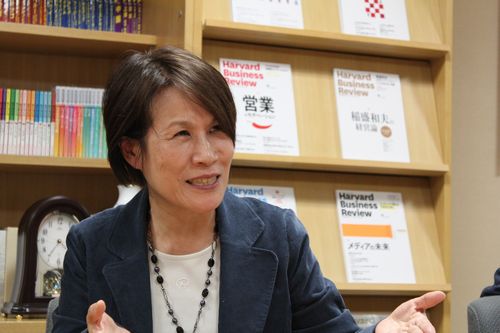
Kogure: Everyone in the team tackles their own projects. We assign the texts from Arc Communications and other companies, then rack our brains during the title meetings.
Ohsato: Are these title meetings very time-consuming?
Kogure: Very much so, indeed.
Iwasa: What matters with a title isn't its correctness. A title has to be gripping.
Kogure: Actually, we editors always hesitate with decisions regarding how to edit a text. There is no right way of choosing, no inflexible rule, so editing is a constant repetition of the trial-and-error process.
Ohsato: Then, how would you define DHBR's idea of a good translation?
Kogure: I believe that the quality of English to Japanese translations is determined by the translators' Japanese writing skills. The level of a translation is greatly influenced by the extent of their vocabulary. This is influenced by how well-read, experienced and knowledgeable the translator is, and these qualities are the key to finding the most fitting expression.
Iwasa: My work is to perform the final check of every edited article, so I don't compare the Japanese translation with the original English copy. If the articles I receive are no good, the editor is at fault, not the translator.
From that point of view, if my friends feel compelled to read the article based on the lead, then it's a good translation. I might also add that I usually read every article out loud. This helps me to determine whether there are any remains of English syntax left in the Japanese phrases, as these discrepancies tend to reveal themselves when uttered.
Kogure: Yes, correcting rugged translations can be quite a handful for editors. That's why we are always thankful when a translation reads naturally, smoothly. Once again, it all boils down to the extent of the translator's vocabulary.
On that point, the work you provide us with is always a great help: not only does it read well, its quality is consistent with every new issue.
Iwasa: I hope we can continue collaborating to maintain the same level of quality with DHBR.
Ohsato: To better fulfill your expectations, with Ms. Saito we will strive to introduce you new resources in addition to our regular stable of DHBR translators.
Iwasa: Thank you very much. What are your screening criteria for finding such translators?
Saito There are three factors we are adamant about: research capacities, flexibility and enthusiasm.
We mentioned it earlier on about titles, but editing DHBR requires a great deal of enthusiasm and time. In a sense, we need our translators to share that feeling for us to function as a team. So after sharing these values, we choose our translators based more on their attitude with regard to this project than on our past work together.
Seeing Through the News with DHBR
Ohsato: One last question before wrapping up, for readers who discovered it through this article: please describe what can be acquired through reading DHBR.
Iwasa: Personally, I would say application. For example, say there is a news item about Sony entering the real estate business. We don't run economic news like this in DHBR.
Still, continuing to read DHBR would help you develop your analogical reasoning about the ins and outs of Sony's strategic move. Indeed, DHBR helps you to naturally integrate notions such as effective managerial methods and the way a new business model ought to be; thus allowing you to understand the underlying truths in daily news.
It is very interesting as it enables you to connect things on a meta-level - "The strategy carried out in that industry is actually the very thing we are trying to do!"
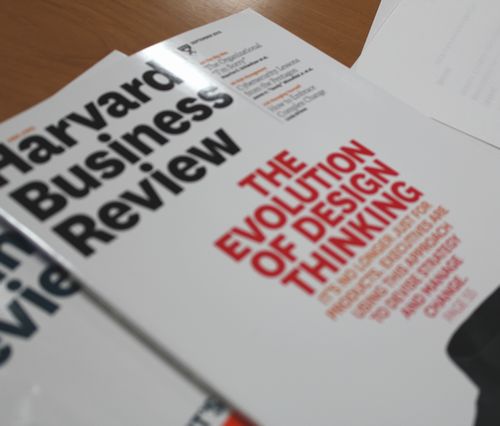
Ohsato: It certainly is! I myself studied at an overseas business school in my twenties, and compared to when I used to read HBR, now I can enjoy the articles more thoroughly and link them to practical business. Thank you very much for your time today and those valuable insights, they are so many reasons more for me to look forward to the next DHBR.
Feature Interview Index

